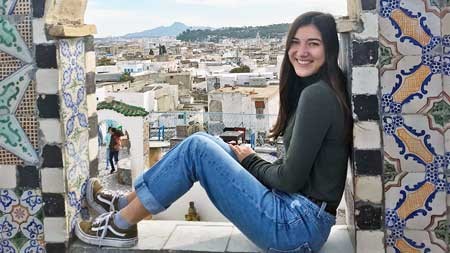Undergraduate travel/study with Global Centers
The centers provide a home-away-from-home for students who may be traveling for study abroad through the Center for Undergraduate Global Engagement, and they can help with questions, emergencies and links to local partners.
More specific programs currently offered by the centers include:
- An exciting slate of academic, credit-bearing programs at the Paris Center. Explore their full-year, semester and summer courses.
- Inspiring travel/study trips as part of students’ education. Our most recent option is a 7-day trip to Athens for Mediterranean Humanities. Search the Engagement website for more.
- Hosting of the Kraft Global Fellowship Program, which has been a years-long partner of the centers. A joint initiative of the Kraft Family Fund for Intercultural and Interfaith Awareness and the Office of the University Chaplain, this unique program selects CU fellows to travel to one of the Global Centers to work on a group research project that focuses on the religions, cultures, and communities of the destination country. Recent intercultural experiences have taken place in Santiago, Tunis and Amman.
- Global Columbia Collaboratory, a free, not-for-credit global course offered in partnership with Undergraduate Global Engagement. Recent Collaboratories with Rio, Nairobi and Mumbai have engaged students in learning and collaborative projects on issues of protecting the Amazon, food security and reducing plastics. The Collaboratory with Rio includes a bucket-list-worthy trip on the Amazon river.

Graduate research/travel/study with the Global Centers
There is a lively interaction between the Centers and many professional schools and graduate programs. A sampling includes:
- Research grants for projects offered by the Rio Center’s Climate Hub, Beijing and Santiago centers.
- Visits to archaeological and cultural sites in Turkey, Tunisia and Jordan; recently, ‘Ifriqifya: The Art and Architecture of Tunisia and The Ancient Wonders of Western Turkey
- Immersion tours from the Business School’s Chazen Institute, recently to Tunis and Mumbai.
- Participation in one of the President’s Global Innovation Fund grants: all grants are required to engage students substantively with research initiatives undertaken in collaboration with the Centers.
Internships, practicums, and capstone projects
The Centers actively engage with both undergraduate and graduate students on practical experiences, both virtual and in person, including:
- Internships at the Global Centers offered through Columbia Global/Columbia World Projects.
- Internship matching with local organizations and advice on the practicalities of internships abroad; see individual Global Center pages for details.
- Partnership with the Mailman School’s Applied Practice Experience (APEx) practicum, which has collaborated with the Paris, Amman, Santiago, and other Centers to welcome students and find local partners.
- Partnerships with the Nursing School’s 8-week practicum; recent examples are from Nairobi and Mumbai; watch students talk about their experiences.
- Support for Columbia’s School of International and Public Affairs’ Capstone Projects in Amman and Nairobi.
- Matching for Columbia-led practical global fellows programs like the Laidlaw program (for undergraduates); see this recent example from Chile.
Connections: a life-cycle approach
The above describes how the Global Centers engage with students while they are at Columbia–but the Centers also engage with students before and after their student years in New York.
Before
All of the centers host information sessions in conjunction with a wide range of Columbia schools, including SIPA (Nairobi), the Business School, the Engineering School (Beijing), the Graduate School of Architecture, Planning and Preservation, the School of Journalism (Rio, Mumbai, Amman), the Law School (Nairobi) and the Climate School (Beijing). These sessions serve as windows into each school's academic programs and admissions processes and culture, offering insights that build confidence and trust among prospective students and their parents.
Newly-accepted students to Columbia are feted at send-off receptions organized by the Centers in Mumbai and Beijing, among others. These celebrations are typically coordinated by the centers and their respective local Columbia alumni clubs.
After
The Centers actively engage with local CU alumni networks to host networking opportunities, and they provide the space for thought-provoking discussions about pressing global and local issues.
They are also gateways for continuing and executive education with Columbia’s Schools, and some also create events to connect with the local job market (see the Beijing Center’s annual Spring Career Fair).
For more information about alumni engagement, see our Alumni overview, and the pages of individual centers.